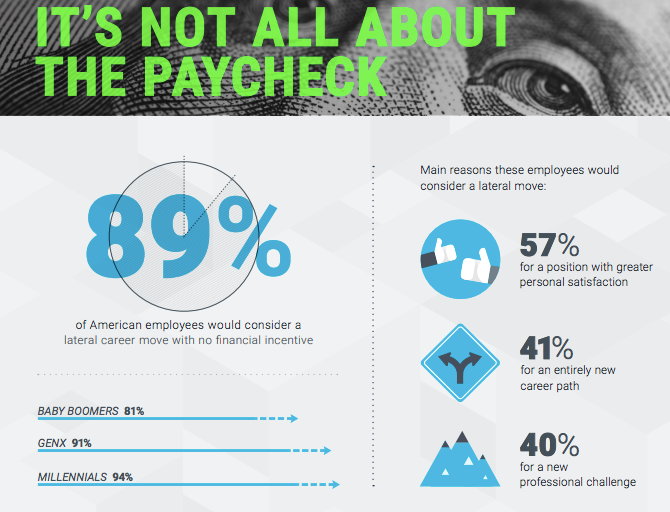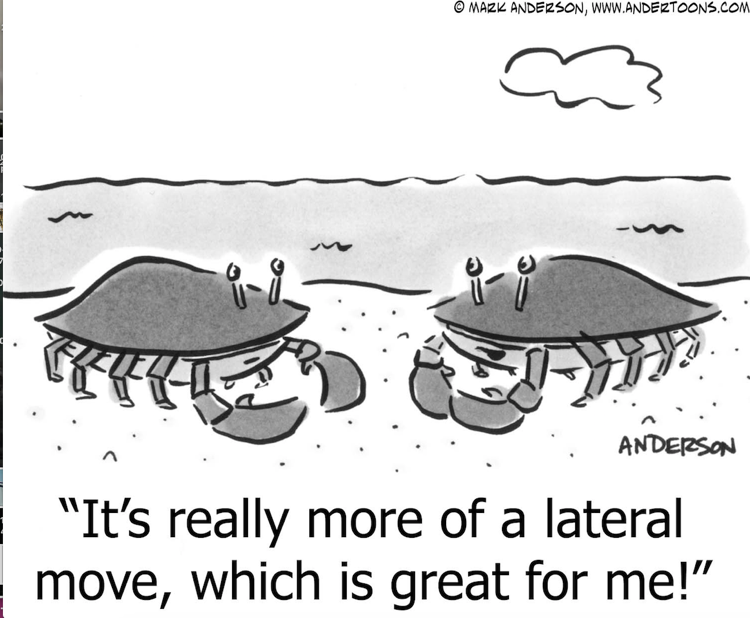In the chess game of your professional development plan, a lateral move can be quite masterful. They can be used on offense or defense to ensure you get where you need going. Often they get a bad rap but have a real payoff when done thoughtfully.
The idea of making a lateral career move has received a bad wrap. Additionally, these steps get treated as something to endure or that happens to you.
The times they are a changin’ – Bob Dylan
Lateral career moves are tools you can use to manage the progression of your career in ways that serve you both professionally and personally. Perceptions are starting to change about the possibilities offered.
Using sports terms, think offense or defense. Use lateral moves to help you gain ground. When danger is in range, use defensively.
Time to be front-footed!
Moving On Up?
By definition, a lateral career move is changing job responsibilities with no immediate adjustment in compensation or title/level. Remember the word immediate as we go forward.
Understandably, people come down differently on the topic.
Lateral moves played a meaningful role in my career progression. Several lateral positions I sought out and several I was asked to take. As will come through in this piece, I am a fan, but admit the gift of hindsight has solidified how much.
I experienced how genuinely exciting and unexpectedly (at the time) powerful a lateral career move is. Titles, compensation and whatever else follow when you chase experience, outwork people and deliver.
The Other Side Of The Aisle
I watched numerous people turned down lateral moves. If it didn’t involve a jump in pay or title, they weren’t interested. I saw several of them left on the side of the highway. People who exhibited greater flexibility and humility passed them by when prime jobs were available.
The worst part, they didn’t see it coming.
One of the underlying assumptions in the “no comp, no thanks” camp is that staying in place is the best position for the next level up. Sometimes that is true; sometimes it is not.
Assuming in today’s environment is a recipe for trouble.

The Modern Day Working Environment
While it’s difficult to track internal job moves accurately, Forrester Research predicts going forward employees will hold twelve to fifteen jobs in their working lifetime
The CareerTrends report by Cornerstone entitled The Pursuit of Employee Purpose looked at what employees care about most regarding work opportunities and assignments:
89% of employees said they would consider a lateral move with no change in financial compensation.
Additionally, the research (see graphic above) detailed the reasons people would consider a lateral move:
- 57% for a position with greater personal satisfaction
- 41% for an entirely new career path
- 40% for a new professional challenge
Reading The Road Signs
It’s critically important to both see and understand your career road signs. For example, are you being asked about your interest in a role or told “you need to do this” subtly or less so? Or, do you see a lateral career move out there that serves your long-term objectives?
Sometimes it is obvious to spot being asked or told. Other times it is more nuanced. It may sound like you are being asked when as time rolls forward you realize it was either a strong suggestion or a tell framed as an ask.
Rarely is there any sinister intent. Some leaders aren’t good at the tough conversations.
Or with organizational change options start to narrow in real time. It is difficult to figure out roles and people when there are more of the latter and less of the former.
Unfortunately, I have watched people end up in horrible situations because they didn’t see the road signs and take the role “offered.” Look for your guides and truth tellers.
Ask the hard question – are you asking or telling – either is fine, I just need to know?
Check out Do You Know The Warning Signs Your Career Is In Jeopardy for more.

When To Seek Out, Consider Or Take A Lateral Career Move – # 1-4
Here is a list of real-scenarios:
Need new problems to solve. Either in tenure or headset, you’ve done the work required and need to focus your energies on different challenges. A lateral career move is an excellent cure for fatigue or burnout.
Organizational change inspired “musical chairs.” During times of change either external or internal, people moves are critical. Ambiguity sets in. It’s difficult to identify what roles are available and what you should pursue. The idea of grabbing a good solid chair before the music stops is smart. Critical is knowing when the music starts playing.
Extend or round out skill set. This is the most obvious reason to take on a lateral assignment. Whatever your career field and focus, the opportunity to experience and learn other dimensions of business (e.g., product, service, sales, operations) are valuable. This kind of change can polish you up for a specific role you desire or propel you forward to something very different. Either outcome is positive.
More, better or both. You see other work and roles you know will be exciting & impactful. You want your contributions to matter. Inside the organization you can get to know the job, the department and the leadership to determine if a lateral move provides you “the more or better” you seek.
When To Seek Out, Consider Or Take A Lateral Career Move 5-8
The boss. You see an opportunity to work for someone, in particular, you can’t pass up. Alternatively, it could be an elegant solution to get away from one who you know it’s time to leave behind.
Step out to step back in. Right or wrong, there is something about leaving a group/function to come back then and run it. I did this early in my career. While there was no guarantee when I moved out, the experience gained and risk-taking combined to put me in a position I’m convinced I wouldn’t have realized staying in place.
Personal reasons/balance/geography. Your circumstances have a tremendous influence on the what, where, how much as it relates to your job. A lateral move can put you in a good or acceptable professional situation while helping you manage challenges and opportunities in your personal life. It can buy you time in several forms.
When you want to stay with the company. If you are fortunate enough to work for an industry leader, a winning culture or an organization with intangibles that work for you, lateral moves can help keep you where you want to be. I worked for an industry leader so starting over wasn’t desirable for me. I needed to switch gears and even careers. Lateral moves played a crucial role in my doing that.
It’s Not The Money; It’s The Money
If the only path you are willing to consider is a perfect stair step of role changes and increased compensation, lateral moves are unfulfilling. As an aside, you likely end up disappointed. I’ve not witnessed a perfectly linear progression.
I applaud the ability to negotiate an improved outcome relative to comp and “benefits.” That said, there are smart career moves that don’t initiate a compensation adjustment immediately. Ultimately you have to decide how you feel about this in general or at a given moment in time. And, personal situations may require you to act.
My experience suggests you win chasing experience. The money follows when you add more value.
There is a generational element to this. As shown in the infographic above, Millenials and GenXers are more willing to make a lateral move without additional, immediate compensation. This has implications today for managing them and as they assume more power in organizations.
Let’s Talk Titles
Titles are something created to describe function and status. Pretending they don’t exist doesn’t make sense, but neither does over indexing to them.
Wanting the acknowledgment is understandable, worrying too much about what’s on your business card is a trap.
Understanding All The Currencies Of A Role
When you change roles money isn’t the only currency worth negotiating. Consider the possibilities and what is valuable for you professionally and personally.
The Harvard Business Review article 15 Rules For Negotiating A Job Offer presents it well:
Consider the whole deal….much of your satisfaction from the job will come from other factors you can negotiate—perhaps even more easily than salary. Don’t get fixated on money. Focus on the value of the entire deal: responsibilities, location, travel, flexibility in work hours, opportunities for growth and promotion, perks, support for continued education, and so forth. Think not just about how you’re willing to be rewarded but also when. You may decide to chart a course that pays less handsomely now but will put you in a stronger position later.
Money is essential but not your only currency.
When To Say No
As valuable as a lateral career move can be, there are times it may not make sense. These include where:
- Bad fit and you have options. Some roles surface where you know the fit isn’t right – leadership, purpose, culture. If you have options, exercise them.
- You can’t be successful. For whatever reason, after assessing the role, you realize you cannot be successful. An all out no may not be the answer. Negotiate in what can make it workable.
- Conflicts with your personal life. There are non-negotiables in your own life. Here again, depending on the circumstances a flat out now may not be feasible. Consider where you and your employer can flex.
Is There A Stigma?
One of the mental hurdles relative to lateral moves is how it “looks” and if there is a stigma associated with taking a new role with no title change or money.
The reality is there may be in some organizations. Again, that is changing quite rapidly. In some ways you could say the next-gen – Millenials and GenX – are more ready and willing than the generations that preceded them. A healthy trend in my book!
More progressive cultures and those focused on development, demonstrate a very different philosophy. If it’s all about how it looks, there are likely other issues in the environment.
The Chess Board
Lateral career moves are part of the chess game that is your career development. Success is progress toward your priorities. Some years that will mean you move up. Other years, over puts you where you need to be that year or on a path to get you where you want the following.
Whether you are on offense or defense, take the reins with lateral career moves. Use with intention in your professional development efforts. (Related: How To Be Sure Your Professional Development Roadmap Works)
Be open-minded to the different forms and time frames for the payoff. It will come. If it doesn’t, worse case you confidently move on with your enhanced skill set and broad base of experience!
Question: What’s your take on lateral career moves? How have you used in progressing your aspirations?





1 comment
Comments are closed.